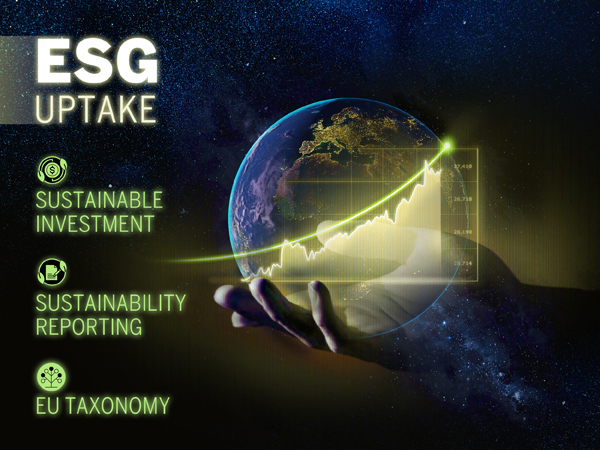
The aim of the ESG-Credit.eu project is to implement a methodology to include environmental, social and governance (ESG) criteria in credit analysis and ratings, including specifically the impact of climate change. Given that ESG factors measure the firm’s sustainability and its ethical skills, the project investigates how those factors affect the creditworthiness of a firm measured by credit ratings over time. Moreover, the project includes in the analysis the impact that climate change could exert over a firm belonging to a certain industry. The expected result of the ESG – Credit.eu project is to introduce augmented credit rating which include ESG factors and climate change scenarios.

The Energy Efficient Mortgage Market Implementation Plan (EeMMIP) will build on efforts to develop Energy Efficient Mortgage (EEM) by delivering an integrated market and a blueprint for established and emerging markets around the globe. The Project will conduct an analysis of the current market systems relevant to the development of an EEM market and establish demonstrators to support the end-to-end customer journey and EEM life-cycle. It will establish market-based governance and an EEM Label to support recognition of and confidence in EEM and facilitate access to quality information for market participants. The project will deliver guidance for the inclusion of energy efficiency in credit risk assessments for lending institutions and supervisors and policy recommendations for the prudential framework in line with the principle of risk sensitivity and promote a well-functioning banking market.
EeMMIP will build on and complement the ongoing efforts under the Energy Efficient Mortgage Initiative (EEMI), which brings together the ongoing EU-funded Energy Efficient Mortgages Action Plan (EeMAP) and Energy Efficient Data Portal & Protocol (EeDaPP) Initiatives, by moving beyond the design of the product to deliver an integrated market for the EEM product.

ENERGYA will improve our understanding of how energy and energy services can be used by households and industries to adapt to the risk posed by climate change. Specifically, the project will develop an interdisciplinary and scalable research framework integrating data and methods from economics with geography, climate science, and integrated assessment modelling to provide new knowledge concerning heterogeneity in energy use across countries, sectors, socioeconomic conditions and income groups, and assess the broad implications adaptation-driven energy use can have on the economy, the environment, and welfare. ENERGYA has three main objectives:

The 2015 Paris Agreement is a key step towards strengthening a global response to address the threat of climate change. It sets global objectives that all signatory countries have to contribute to achieve through the implementation of urgent actions to reduce greenhouse gas emissions and promote climate-resilience and low-carbon development. ACTION project aims at enhancing transparency and comparability among countries’ climate change policies while offering insights into a fair and just transition toward the sustainable development. The project will develop a quantitative approach to empirically assess national climate policies in terms of severity, drivers and economic impact. Project results will assist policymakers in understanding the effectiveness of coordinated policy efforts and design their future climate agenda. ACTION will be hosted in two highly qualified institutions: during the outgoing phase (24 months) at Harvard Kennedy School of Government, under the guidance of Prof. Aldy, and during the incoming phase (12 months) at the Department of Economics of Ca’ Foscari University. The supervisor of the project is Prof. Enrica De Cian.

SHARE, the Survey of Health, Ageing and Retirement in Europe, is a research infrastructure to better understand and cope with the challenges and chances of population ageing. The main objective of SHARE is to provide excellent data for aging research through a combination of (a) transdisciplinarity, (b) longitudinality and (c) European coverage with strict cross-national comparability through ex-ante harmonisation. With its recent seventh wave, SHARE succeeded in covering all EU member states in cooperation with the British Isles Surveys (UK and Ireland). The coverage of all EU member states (plus Switzerland and Israel) is particularly attractive for both scientific and Commission users because it permits cross-national comparisons of the economic, health and social situation of EU citizens aged 50 and over and allows for comparative evaluations of aging-related policies such as pension, health and long-term care reforms. The project will support the supra-national innovation and development tasks during Waves 8-10 of SHARE, thereby improving the scientific state-of-the-art of SHARE and cross-national cohesion across all 28 SHARE member countries. It addresses all seven targets of this call and the related sustainability criteria. Scientific innovation encompasses new questionnaire content including device-based measures; development encompasses more efficient survey methods including new electronic tools.

SmartCulTour aims to support regional development in European regions, with special attention to rural peripheries and the urban fringe, through sustainable cultural tourism. The project redefines cultural tourism through a contemporary lens and provides a comprehensive measurement framework for supply, demand and impacts. In order to support knowledge-led destination management, a decision-support system (DSS) will be developed for wide-scale monitoring purposes across European regions. The DSS will synthesize both traditional and non-traditional data sources, the latter particularly related to big data analytics, thereby assisting smart regional development. Besides a contribution to conceptual development and cultural tourism measurement, the main objective of SmartCulTour relates to the facilitation of community-led rural development through field experimentation in 6 living labs. Prior to these living labs, a comprehensive desk research will identify significant sustainable cultural tourism policies, their impacts and critical success factors. These best cases will inspire a series of possible local interventions. Within the living labs, novel creative approaches to stakeholder engagement are tested, notably arts-based methods, serious games, and service design which will help to provide local context and support. A toolkit will be designed to help destinations implement local actions towards sustainable cultural tourism development. SmartCulTour will therefore contribute to theory development, empirical validation of best practices within a living labs setting, and procedural development, particularly by providing European regions with a set of strategies to optimally engage with stakeholders and co-create sustainable cultural tourism experiences.

Improving access to long-term finance for Energy Efficiency (EE) projects is key to achieve the EU2030 targets and aligning the COVID-19 recovery to the European Green Deal. However, the lack of standardized disclosure of EE investments limits firms’ access to EE financing. Further, poor understanding of EE information in ESG ratings increases the risk of greenwashing, thus preventing a smooth development of the sustainable finance market. TranspArEEnS addresses these barriers by mainstreaming a quali-quantitative framework for standardized collection and analysis of firms’ EE and ESG information and the development of a standardized EE-ESG rating. This serves as an EE-ESG filter to inform investment and financial policy decisions with regard to portfolios’ alignment to sustainability. A unique added value of this project is to cover non-listed Small and Medium Enterprises, meeting an important market need. TranspArEEnS’ EE-ESG rating will be tested in pilot case studies and capacity building sessions with leading representatives of the financial industry and supervisors. TranspArEEnS’ EE-ESG rating will be tested in pilot case studies and capacity building sessions with leading representatives of the financial industry and supervisors.
This allows to understand barriers and opportunities for its operationalization in:
By enhancing standardized disclosure of EE investing, TranspArEEnS will decrease uncertainty in the EE and ESG market, thus promoting the scaling up of new EE financing and investment opportunities in the EU. Moreover, it will help to mitigate the risk of greenwashing thus improving financial stability.

WaterLANDS aims to enable an upscaling of the restoration of wetlands. Socio-economic factors, insufficient stakeholder engagement, lack of government commitment, lack of funding and inadequate exchange of knowledge of restoration methods have all been identified as barriers to successful restoration. Consequently, most restoration has been modest in scale, has occurred mainly where there is a single landowning or responsible organisation, and has often been undertaken principally for reasons of conservation.
WaterLANDS will work to overcome these barriers. It includes both Action and Knowledge Sites, the former being the object of restoration upscaling, and the latter a source of best practice experience and knowledge. To provide for local support and sustainability, it will aim for the co-design of restoration with the on-going engagement of communities and stakeholders. It will investigate best practice in ecological restoration which meets both biodiversity and social objectives and for which restoration trajectories are specific to the physical and cultural context of the Action Sites.
It will propose supportive governance structures appropriate to this process and to local and national circumstances. It will identify business models, economic incentives and international funding sources and tailor or direct these resources for each site. The project will pull this expertise and knowledge together in a cocreation work package. Process-indicators will be developed to enable on-going assessment of restoration success in terms of ecosystem services, socioeconomic embedding and financial sustainability, to ensure wide-scale restoration which catalyses scalability beyond the life of the WaterLANDS project.

ESG-UPTAKE is a project, funded by EU Commission DG-Reform and coordinated by Ca’ Foscari University of Venice, to strengthen the capacity EU Member States' National Competent Authorities (NCAs) to monitor and address ESG (Environmental, Social, and Governance) and climate risks in the financial sector.
Specifically, the project supports a selected group of 11 NCAs in identifying, monitoring, and assessing the impact of ESG risks on their supervised entities and the entire financial sector.
ESG-UPTAKE aims to facilitate the uptake and implementation of a risk-based supervisory approach to assess and mitigate ESG and climate risks. This approach is complemented by reporting systems, data, and methodologies based on best practices. This, in turn, will enhance NCAs' ability to manage ESG risks promptly and appropriately (including through ESG and climate stress-tests), assess and oversee compliance with ESG and climate-related disclosure and reporting requirements, thereby contributing to informing the adoption of appropriate supervisory responses.